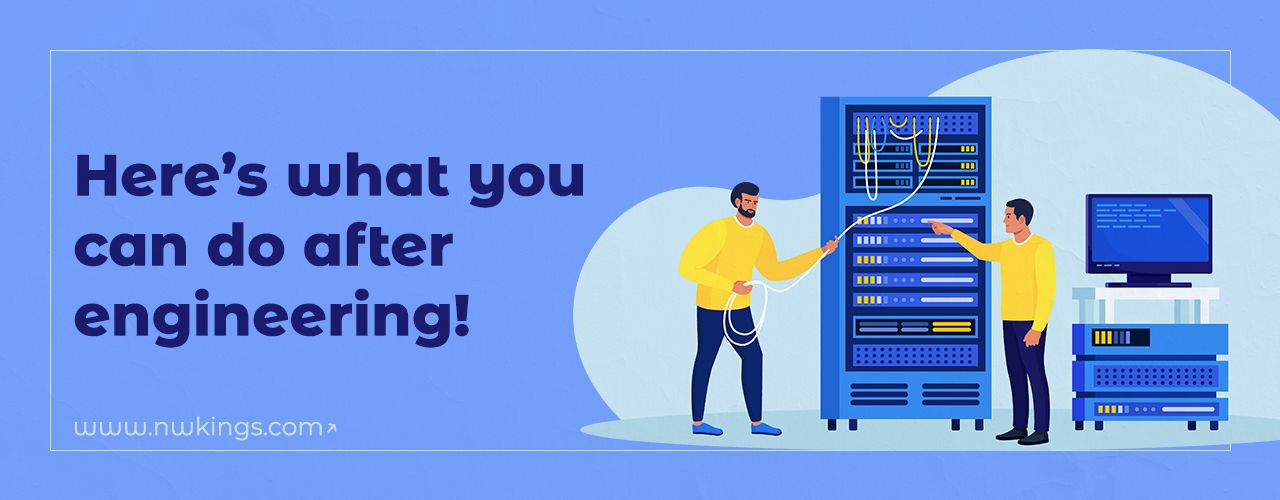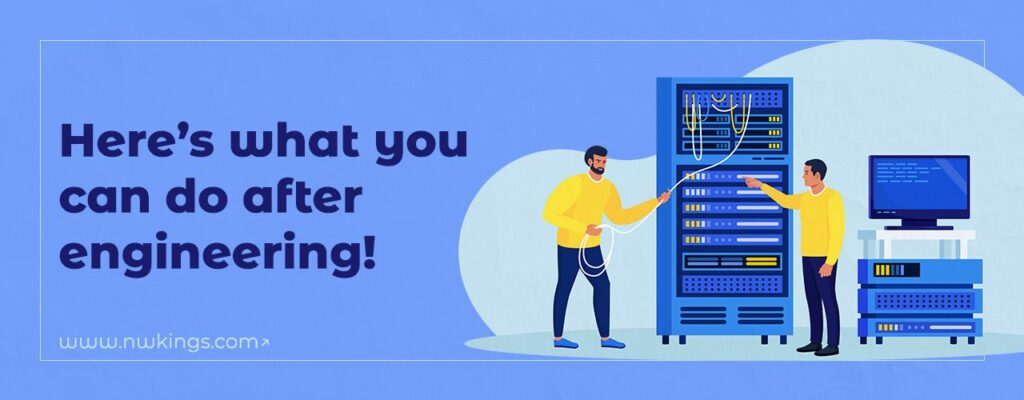
Are you looking for the best Technical Courses after Graduation? Technical education enables us to equip students for a career where they can use scientific and technical principles to develop solutions. Technical education concentrates on delivering industrial training and imparting knowledge for precise purposes that help to create or enhance one’s career.
This blog will cover all the essentials of Technical courses after Graduation.
What are Technical Courses?
Before delving into the specifics, it’s important to understand what technical courses entail. Technical courses are specialized programs that focus on equipping individuals with practical skills and knowledge related to a specific field. These courses are designed to provide hands-on training and expertise required to excel in industries such as IT, engineering, data science, web development, and more.
List of Technical Courses after Graduation?
Here is a list of the top domains of the Technical Courses after Graduation:
Network Security:
Network security is the security of a network’s infrastructure from unauthorized access, theft, or misuse. It concerns building a secure environment for users, applications, devices, and applications to work together safely.
It includes courses like:
CCNA 200-301:
The CCNA Course helps learners with all the necessary skills required in the field of networking. The Cisco Certified Network Associate (CCNA) is a beginner-level technical certification course offered by Cisco which serves as the stepping stone in your IT career catering to you with all the necessary skills required in the field of Networking. CCNA Certification is one of the most popular & in-demand Networking certifications in the industry. The CCNA course covers the essentials of Networking such as Network Security Fundamentals, Automation, Programmability, and Routing and switching. You’ll get in-depth CCNA training after enrolling & can become a skilled Network Engineer in the tech world.
| Exam Code | CCNA 200-301 |
| Exam Level | Associate |
| Exam Cost | $300 |
| Exam Duration | 120 Minutes |
| Exam Format | MCQ & Multiple Response |
| Total Questions | 90-110 Questions |
| Passing score | Variable (750-850 / 1000 Approx.) |
| Language | English & Japanese |
CCNP Enterprise:
The Cisco Certified Network Professional (CCNP) is an intermediate-level course offered by Cisco that provides in-depth knowledge, understanding, functioning, and maintenance of the study of everything regarding Service Providing Solutions and Networking. The Cisco CCNP course consists of the core technologies with Enterprise Specialization as it is an upgrade of the pre-existing Networking experience provided through Cisco CCNA certification for CCNP training. CCNP Enterprise training involves advanced Routing, Switching, Troubleshooting, Security, SDN, etc.
| Exam Code | 350-401 ENCOR + 300-410 ENARSI |
| Exam Level | Professional |
| Exam Cost | $400 + $300 |
| Exam Duration | 120 + 90 Minutes |
| Exam Format | MCQ & Multiple Response |
| Total Questions | 90-110 Questions |
| Passing score | Variable (750-850 / 1000 Approx.) |
| Language | English & Japanese |
CCNP Data Center:
The Cisco Certified Network Professional certification or CCNP data center course is an intermediate-level course offered by Cisco that provides in-depth knowledge, understanding, functioning, and maintenance of the study of everything regarding Data Center Solutions and Networking. The CCNP Data Center professionals’ role is to develop, deploy, and monitor the modern Data Center Infrastructure. CCNP Data Center training provides an in-depth understanding of complex CCNP Data Center course environments, policy-driven infrastructure, virtualization, automation, and orchestration.
| Exam Code | DCCOR – 350-601 |
| Exam Level | Professional |
| Exam Cost | $400 |
| Exam Duration | 120 Minutes |
| Exam Format | MCQs |
| Total Questions | 90-110 Questions |
| Passing score | 849 out of 1000 |
| Language | English |
CCNP Security:
The Cisco Certified Network Professional or CCNP course certification is offered by Cisco. CCNP Security training certification deals with the study of the skills of the candidates required to Secure Network Design and Implementation using Cisco Secure Access, Edge Network Security, Threat Control, and Secure Mobility solutions.
| Exam Name | Implementing Cisco Enterprise Network Core Technologies |
| Exam Cost | USD 400 |
| Exam Format | Multiple Choice |
| Total Questions | 120 Questions |
| Passing Score | 849 out of 1000 |
| Exam Duration | 2 Hours (120 Minutes) |
| Languages | English |
| Testing Center | Pearson Vue |
CCNP Service Provider:
The Cisco Certified Network Professional or CCNP course certification is offered by Cisco. CCNP Security training certification deals with the study of the skills of the candidates required to Secure Network Design and Implementation using Cisco Secure Access, Edge Network Security, Threat Control, and Secure Mobility solutions.
| Exam Name | Implementing & Operating Cisco Service Provider Network Core Technology |
| Exam Code | SPCOR 350-501 |
| Exam Cost | USD 400 |
| Exam Format | Multiple Choice |
| Total Questions | 120 Questions |
| Passing Score | 849 out of 1000 |
| Exam Duration | 2 Hours (120 Minutes) |
| Language | English |
| Testing Center | Pearson Vue |
CCIE Enterprise:
Do you want to enhance your network engineering skills to the next level? The CCIE course training is a perfect solution for you! The Cisco Certified Internetwork Expert (CCIE) Enterprise course is an advanced-level certification offered by Cisco Systems. The CCIE training program validates your skills in designing, deploying, and troubleshooting complex enterprise networks. CCIE course is one of the most prestigious certifications for those learners who want to gain advanced knowledge and skills in various networking areas.
| Exam Name | 350-401 ENCOR |
| Exam Cost | USD 450 |
| Exam Format | Multiple Choice |
| Total Questions | 100 Questions |
| Passing Score | 860 out of 1000 |
| Exam Duration | 8 Hours (480 Minutes) |
| Languages | English |
| Testing Center | Pearson Vue |
CCIE Enterprise Wireless:
The CCIE Enterprise Wireless course is all set to equip you with the best. The CCIE Enterprise Wireless certification will provide you with in-depth knowledge and hands-on experience in the field of wireless networking. Also, you can make up to 10+ LPA as a fresher with our top-notch CCIE Enterprise Wireless training.
| Exam Name | 350-401 ENCOR + Lab exam |
| Exam Cost | USD 450 |
| Exam Format | Multiple Choice |
| Total Questions | 100 Questions |
| Passing Score | 860 out of 1000 |
| Exam Duration | 8 Hours (480 Minutes) |
| Languages | English |
| Testing Center | Pearson Vue |
CCIE Data Center:
The CCIE Data Center training is the best choice for learning how to scale and secure infrastructure using the power of automation. The CCIE Data Center certification is the most distinguished certification offered by Cisco that can place you as a technical leader in the fast-paced world of data center infrastructure.
| Exam Name | Implementing and Operating Cisco Data Center Core Technologies (DCCOR 350-601) |
| Exam Format | Multiple-choice, simulations, and drag-and-drop |
| Passing Score | 750 out of 1000 |
| Exam Duration | 120 Minutes |
| Languages | English |
| Testing Center | Pearson Vue |
CCIE Security:
The Cisco Certified Internetwork Expert or CCIE course Certification is meant for Senior Engineers and falls under the category of expert certifications offered by Cisco. CCIE training or CCIE Security training certification deals with the study of complex Security Solutions and further helps in understanding, designing, deploying, and managing the Network Systems to keep them secure.
| Exam Name | CCIE Security – Implementing and Operating Cisco Security Core Technologies |
| Exam Number | 350-701 SCOR |
| Exam Price | $450 |
| Duration | 120 minutes |
| Number of Questions | 90-110 |
| Passing Score | 82.5% |
CCIE Service Provider:
The CCIE Service Provider training will equip you with the in-demand IT expertise. The CCIE Service Provider certification will provide you with the skills and knowledge required to become a certified expert in the field of service provider networking. Whether you are a networking professional looking to enhance your career or a beginner interested in starting a career in networking, the CCIE Service Provider course is tailored to meet your needs.
| Exam Name | 350-501 |
| Exam Format | Lab |
| Passing Score | 860 out of 1000 |
| Exam Duration | 8 Hours (480 Minutes) |
| Languages | English |
| Testing Center | Pearson Vue |
CCIE DevNet:
This CCIE DevNet course makes you an expert in planning, developing, designing, and maintaining complex network environments that run on automation.
With the CCIE DevNet certification, you can take on leadership roles in the agile automation-driven IT landscape.
| Exam Name | Developing Applications using Cisco Core Platforms and APIs (350-901 DEVCOR) |
| Exam Format | Multiple-choice questions |
| Passing Score | 720 out of 1000 |
| Exam Duration | 120 Minutes |
| Languages | English |
| Testing Center | Pearson Vue |
Cisco SD-WAN:
The SD-WAN Certification helps in upgrading skills and knowledge regarding in-depth networking. The Software-Defined Wide Area Network or SD-WAN course builds expertise in designing, installing, arranging, and managing SD-WAN solutions in wide networks in a short period. The Cisco SD-WAN training Certification also teaches the SD-WAN installation and migration, placement of controllers, deploying and replacing edge devices, and the ways to configure Direct Internet Access (DIA).
| Exam Code | SDWAN 300-415 ENSDWI |
| Exam Level | Associate |
| Exam Cost | $300 |
| Exam Duration | 90 Minutes |
| Exam Format | MCQ & Multiple Response |
| Total Questions | 55-65 Questions |
| Passing score | Variable (750-850 / 1000 Approx.) |
| Language | English & Japanese |
Cloud Security:
Cloud security is a pack of policies, procedures, and technologies that cover cloud-based data, applications, and infrastructure. It assures the security and integrity of cloud computing models during attacks or violations. It includes courses like:
AWS Associate:
Amazon Web Services or AWS course is offered by Amazon that provides trustworthy, inexpensive, and extensible Cloud Computing Services. AWS training includes a mixture of Infrastructure-as-a-Service (IaaS), Platform-as-a-Service (PaaS), and Software-as-a-Service (SaaS) offerings. The AWS Certified Solutions Architect Associate Certification course is a beginner-level course that provides cloud computing services and deals with the study of designing, deploying, and evaluating applications on AWS within diverse and complex requirements.
| Exam Name | AWS Certified Solutions Architect – Associate exam |
| Exam Code | SAA-C02 |
| Exam Level | Associate |
| Exam Duration | 130 minutes |
| Total Questions | 65 (multiple choice and multiple response questions) |
| Exam Cost | 150 USD |
| Passing Score | 720 out of 1000 |
| Exam Language | English, French, German, Italian, Japanese, Korean, Portuguese, Chinese and Spanish |
| Testing Center | Pearson Vue |
AWS Professional:
Amazon Web Services or AWS Professional course training is offered by Amazon which provides trustworthy, inexpensive, and extensible Cloud Computing Services. AWS training includes a mixture of Infrastructure-as-a-Service (IaaS), Platform-as-a-Service (PaaS), and Software-as-a-Service (SaaS) offerings. The AWS Certified Solutions Architect Professional Certification course is an advanced-level certification dealing with the study of designing, deploying, and evaluating applications on AWS course within diverse and complex requirements. Learn in-depth about Solution Architecture and then leverage your skills to land a high-profile job in the IT industry to sustain in the technology ecosystem in AWS training.
| Degree | Certificate |
| Duration | Course Duration of AWS is 30+ Hours. |
| Qualification | Graduate |
| Average Salary | Up to INR 5 to 8 LPA |
| Employment Roles | AWS Cloud Architect, IoT Architect, Cloud Developer, Cloud Sales & Purchase Manager |
| Placement Opportunities | Tata Consultancy Services (TCS), Accenture, Cognizant, Infosys, and many more. |
AWS DevOps:
The AWS Certified DevOps Engineer Professional or AWS DevOps course is designed to make aspiring individuals capable of implementing solutions as DevOps engineers. DevOps course provides a deep introduction to provisioning, operating, and managing distributed application systems on the AWS platform. It enables you to implement DevOps training methodologies on AWS such as CloudDevelopment, CodeCommit, OpsWorks, etc., and a deep understanding of core concepts to clear the AWS Certified DevOps Engineer – Professional DOP-C01 exam.
| Exam Name | AWS Certified DevOps Engineer Professional exam |
| Exam Code | DOP-C01 |
| Level | Professional |
| Exam Cost | 300 USD |
| Exam Format | Multiple Choice or Multiple Response questions |
| Total Questions | 75 questions |
| Passing Score | 750 out of 1000 |
| Exam Duration | 180 minutes |
| Languages | English, Simplified Chinese, Korean, and Japanese |
| Testing Center | Pearson Vue testing center or online proctored exam |
AWS Security:
The AWS Security course, a vital component of Amazon Web Services (AWS) educational offerings, explores the realm of trustworthy, cost-effective, and scalable Cloud Computing Services. Tailored for those seeking a specialized focus on security, the AWS Security training encompasses a diverse mix of the AWS ecosystem. The AWS Security certification equips participants with the knowledge and skills to fortify cloud environments against evolving threats. Whether you are an IT professional or security enthusiast, the AWS Security program offers a deep dive into securing AWS applications and infrastructure, ensuring robust protection within the dynamic landscape of cloud computing.
| Exam Name | AWS Security |
| Exam Code | SCS-C01 |
| Exam Level | Specialty |
| Exam Duration | 170 minutes |
| Total Questions | 65 questions |
| Exam Cost | USD 300 |
| Exam Language | English, French (France), Italian, Japanese, Korean, Portuguese (Brazil), Simplified Chinese, and Spanish (Latin America) |
| Testing Center | Pearson Vue |
AWS Network Specialist:
The AWS Network Specialist course, delivered by Amazon Web Services, immerses participants in the realm of trustworthy, cost-effective, and scalable Cloud Computing Services. AWS Network Specialist training is tailored for aspiring cloud engineers, delving into the intricate art of designing, deploying, and evaluating applications on AWS. Therefore, elevate your expertise with our AWS Network Specialist certification, mastering the intricacies of Amazon’s cloud infrastructure and positioning yourself as a proficient architect in the dynamic world of cloud technology.
| Exam Name | AWS Certified Advanced Networking – Specialty |
| Exam Code | ANS-C01 |
| Exam Format | Multiple-choice questions & Multiple Response |
| Exam Level | Specialty |
| Exam Duration | 170 minutes |
| Total Questions | 65 questions |
| Exam Cost | USD 300 |
| Exam Language | English, French (France), Italian, Japanese, Korean, Portuguese (Brazil), Simplified Chinese, and Spanish (Latin America) |
| Testing Center | Pearson Vue |
Microsoft Azure 104:
The Microsoft Azure course (Cloud platform) is designed to bring new solutions to life and provides a range of Cloud Services including computing, analytics, storage, and networking. Azure training is also commonly used as a platform for teaching the hosting databases in the cloud. Microsoft Azure course is one of several major public cloud service providers operating on a large global scale. Other major providers include Google Cloud Platform (GCP), Amazon Web Services (AWS), and IBM.
| Exam Name | Microsoft Azure Administrator |
| Exam Code | AZ-104 |
| Exam Cost | USD 165 |
| Exam Format | Multiple-choice questions |
| Total Questions | 40-60 questions |
| Passing Score | 700/1000 |
| Exam Duration | 150 minutes |
| Languages | English, Japanese, Chinese, Korean, Spanish, French, German, Italian, Indonesian |
| Testing Center | Pearson VUE |
Azure 500:
The AZ-500 course delves into Microsoft Azure, a dynamic cloud platform offering diverse solutions in computing, analytics, storage, and networking. Tailored for those navigating the cloud landscape, AZ-500 training is pivotal for implementing innovative solutions. Azure is a leading choice for hosting databases in the cloud, providing a robust foundation for scalable and secure applications. Therefore, elevate your skills with the AZ-500 certification program, mastering Azure’s capabilities and contributing to the evolution of cutting-edge cloud technologies.
| Exam Name | Microsoft Azure Security Technologies |
| Exam Code | AZ-500 |
| Exam Cost | USD 165 |
| Exam Format | Multiple-choice questions |
| Total Questions | 40-60 questions (one lab with 12 sub-tasks) |
| Passing Score | 700/1000 |
| Exam Duration | 150-210 minutes |
| Languages | English, Japanese, Chinese, Korean, Spanish, French, German, Italian, Indonesian |
| Testing Center | Pearson VUE |
Azure 700:
The AZ-700 course immerses participants in the transformative realm of Microsoft Azure, a cutting-edge cloud platform that breathes life into innovative solutions. This AZ-700 training equips individuals with the skills to navigate and harness the full potential of Azure’s capabilities. Therefore, elevate your expertise with the AZ-700 certification program, charting a course to master the intricacies of Azure and contribute to the forefront of cloud technology.
| Exam Name | Designing and Implementing Microsoft Azure Networking Solutions |
| Exam Code | AZ-700 |
| Exam Cost | USD 165 |
| Exam Format | Multiple-choice questions |
| Total Questions | 40-60 questions (one lab with 12 sub-tasks) |
| Passing Score | 700/1000 |
| Exam Duration | 120 minutes |
| Languages | English, Japanese, Chinese, Korean, Spanish, French, German, Italian, Indonesian |
| Testing Center | Pearson VUE |
GCP Cloud:
(Google Cloud Platform) GCP certification provides fundamental to advanced-level skills required in designing, implementing, and managing Google Cloud products. GCP course validates your understanding of cloud concepts regarding products, services, tools, features, benefits, and use cases of Google Cloud by dealing with concepts like resource monitoring, load balancing, autoscaling, cloud migrations, etc.
| Exam Code | GCP-ACE |
| Exam Cost | USD 125 |
| Number of Questions | 50 |
| Test Format | Multiple Choice |
| Duration | 120 Minutes |
| Passing Score | 70% |
Docker and Kubernetes:
Docker and Kubernetes are the newest trends in Cloud Computing courses offered by DevOps training by working in collaboration with the Cloud. Learning Docker and Kubernetes together has numerous benefits. They are tools that work well together. In a nutshell, Docker training is a suite of software development tools for creating, sharing, and running individual containers; Kubernetes training is a system for operating containerized applications at scale. Learn how to create containers using Docker and manage them using Kubernetes in real-time.
| Course Duration | 2 Months |
| Learning Hours | 40 |
| Level | Associate |
| Lab Access | 24*7 |
Cyber Security:
Cyber security is the application of technologies, processes, and controls to defend systems, networks, programs, devices, and data from cyber-attacks. It seeks to lower the threat of cyber-attacks and safeguard against the unauthorized exploitation of systems, networks, and technologies. It includes courses like:
CEH (V12):
A Certified Ethical Hacker (CEH) course is a skilled professional training program that covers a wide range of topics, including network security, cryptography, web application security, and system hacking. The sole purpose of the CEH course is to recognize individuals who have demonstrated the knowledge and skills to understand and identify weaknesses and vulnerabilities in a computer system through CEH training. During the course program, you will learn to prevent the chance of any malicious hacking that can exploit the system if not detected on time. The CEH Certification course has a global recognition that imitates the skills and techniques of Hostile Hackers.
| Exam Name | Certified Ethical Hacker (312-50) |
| Exam Cost | USD 550 |
| Exam Format | Multiple Choice |
| Total Questions | 125 Questions |
| Passing Score | 60% to 85% |
| Exam Duration | 4 Hours |
| Languages | English |
| Testing Center | Pearson Vue |
CISSP Training:
The CISSP training program comprises designing, implementing, and managing best-in-class cybersecurity programs. With a CISSP certification, one can validate the expertise and evolve as an (ISC)² member by opening an expansive exhibition of premier resources, scholarly devices, and peer-to-peer networking possibilities.
| Exam Name | ISC2 Certified Information Systems Security Professional |
| Exam Code | CISSP |
| Exam Cost | USD 749 |
| Exam Duration | 4 hours |
| Number of Questions | 125-175 |
| Exam Format | Multiple choice and advanced innovative questions |
| Passing Marks | 700/1000 points |
| Exam Language | English |
| Testing Center | (ISC)^2 authorized PPC, PVTC Select Pearson VUE tests |
CompTIA PenTest+:
The CompTIA PenTest+ Certification course provides the skills required to plan, scan, and perform vulnerability and penetration testing as it is both, a knowledge-based and performance-based PenTest+ exam. Since the PenTest+ course refers to the practice of testing a computer system, network, or web application to find security vulnerabilities that can be damaged by malicious cyber attacks, CompTIA PenTest+ training covers the security of all the technologies. It is the only exam available
to date that covers all the vulnerability management requirements. The exam includes cloud, hybrid environment, web applications, Internet of Things (IoT), and traditional on-premises testing skills.
| Exam Code | PT0-002 |
| Number of Questions | Maximum of 85 questions |
| Exam Cost | $392 |
| Type of Questions | Performance-based and multiple choice |
| Length of Test | 165 minutes |
| Passing Score | 750 (on a scale of 100-900) |
| Languages | English, Japanese, Portuguese and Thai |
| Testing Provider | Pearson VUE |
CompTIA Security+:
The CompTIA Security+ course certification is offered by the non-profit trade association CompTIA which focuses on providing interactive information along with managing the risks. CompTIA Security+ training is considered an entry-level credential of CyberSecurity which helps in learning all the foundational skills that demand cybersecurity skills including system administrator, security administrator, and network administrator for IT Jobs.
| Exam Code | SY0-601 |
| Number of Questions | Maximum of 90 questions |
| Type of Questions | Multiple choice and performance-based |
| Length of Test | 90 minutes |
| Passing Score | 750 |
| Exam Cost | USD 392 |
| Testing Provider | Pearson VUE |
| Languages | English, Japanese, Vietnamese, Thai, Portuguese |
CompTIA A+:
The CompTIA A+ course certification is offered by the non-profit trade association CompTIA which focuses on providing all the knowledge and skills associated with the Initial Security Protocols in IT Systems and also teaches how to run and manage different kinds of OS on Multiple Devices at the same time. CompTIA A+ training also prepares you to learn and run the basic level Data Backup and Recovery Services. A+ course is considered a certification course that can brush up your skills in troubleshooting and supporting and maintenance of IT Infrastructure.
| Exam Code | Core 1 (220-1101) , Core 2 (220-1102) |
| Degree | Certificate |
| Duration | Course Duration of Comptia A+ is 10+ Hours. |
| Qualification | Graduate |
| Average Salary | Upto INR 2+ LPA |
| Employment Roles | Systems Administrator, Security Administrator, Security Specialist, Security Engineer, Network Administrator, Junior IT Auditor, Penetration Tester, Security Consultant |
| Placement Opportunities | CSS Corp, Airtel, Wipro, Ericsson, Sophos and many more. |
CompTIA Network+:
The CompTIA Network+ course certification is offered by the non-profit trade association CompTIA which helps you learn the skills essential to establish, maintain, and troubleshoot important networks without any threat or danger as a lot of businesses are dependent on those networks. CompTIA Network+ training also prepares you to provide support to networks on any kind of platform. The CompTIA Network+ course is known to be the way to progress for those Individuals who want to carry on further to the path of CompTIA’s Network+ training certification as it helps in designing and implementing functional networks.
| Exam Code | N10-008 |
| Exam Cost | USD 338 |
| Number of Questions | 90 |
| Types of Questions | Multiple-choice, performance-based |
| Exam Duration | 90 minutes |
| Passing Marks | 720 out of 900 |
| Exam Language | English, Japanese, Vietnamese, Thai, Portuguese |
| Experience Needed | Over 9-12 months |
| Expiry | After Three years |
CompTIA CySA+:
The CompTIA CySA+ course certification is offered by the non-profit trade association CompTIA which helps you in emphasizing software and application security, automation, threat hunting, and IT regulatory compliance, which affects the daily work of security analysts.
| Exam Name | CompTIA CySA+ |
| Exam Code | CS0-003 |
| Exam Cost | USD 392 |
| Exam Format | Multiple-choice and performance-based questions |
| Total Questions | 85 questions |
| Passing Score | 750/900 |
| Exam Duration | 165 minutes |
| Languages | English, Japanese, Portuguese, and Spanish |
| Testing Center | Pearson VUE |
LINUX:
Linux is an open-source operating system (OS). An operating system is the software that instantly operates a system’s hardware and resources, like CPU, memory, and storage. The OS is presented between applications and hardware and makes the connections between all of your software and the physical resources that do the work. It includes courses like:
Red Hat Linux: RedHat Linux Certification (RHCSA) is a Linux-based operating system known as an open-source distribution like Fedora. RedHat Linux course is more stable and has fewer cutting-edge compared to Fedora. It enables the Network to perform the core system administration skills required in Red Hat Enterprise Linux environments. Red Hat Linux training helps to understand and use essential tools for handling files, directories, command-line environments, and documentation by creating simple shell scripts.
- RHCSA:
The RHCSA certification is for candidates who want to prove their skills as a Linux System Administrator or a Certified Linux Engineer. The format of the RHCSA exam is as follows:
Exam Name | Red Hat Certified System Administrator (RHCSA) exam |
Exam Code | EX200 |
Exam Cost | USD 400 |
Exam Format | Lab-based practical questions |
Total Questions | 20-25 questions |
Passing Score | 210/300 |
Exam Duration | 150 minutes |
Languages | English, Japanese, Korean, and Simplified Chinese |
Testing Center | Pearson VUE |
RHCE:
The RHCE certification is for candidates who want to prove their skills as a Red Hat Certified Engineer and want to focus on system administration, networking, security, storage management, and automation.
Three exams for RHCE specify different versions of the Red Hat Linux. These are as follows:
- EX294: This exam is based on Red Hat Enterprise Linux 8 (RHEL 8). This exam covers topics such as security, storage management, networking, system administration, and automation using Ansible.
Exam Name | Red Hat Certified Engineer (RHCE) |
Exam Code | EX294 |
Exam Cost | USD 400 |
Exam Format | Performance-based questions |
Total Questions | 15-20 questions |
Passing Score | 210/300 |
Exam Duration | 4 hours |
Languages | English, Japanese, Korean, and Simplified Chinese |
Testing Center | Pearson VUE |
- EX298: This exam is based on the Red Hat Enterprise Linux 7 (RHEL 7). This exam includes topics like system administration tasks, security, network services, and troubleshooting by using the RHEL 7 environment.
Exam Name | Red Hat Certified Engineer (RHCE) |
Exam Code | EX298 |
Exam Cost | $400 + applicable taxes |
Exam Format | Performance-based questions |
Total Questions | 15-20 questions |
Passing Score | 210/300 |
Exam Duration | 4 hours |
Languages | English, Japanese, Korean, and Simplified Chinese |
Testing Center | Pearson VUE |
- EX300: This exam does not belong to a specific version of Red Hat Enterprise Linux. It covers topics such as security, network services, administration tasks, virtualization, and troubleshooting.
Exam Name | Red Hat Certified Engineer (RHCE) |
Exam Code | EX300 |
Exam Cost | $400 + applicable taxes |
Exam Format | Performance-based questions |
Total Questions | 10 questions |
Passing Score | 210/300 |
Exam Duration | 3.5 hours |
Languages | English, Japanese, Korean, and Simplified Chinese |
Testing Center | Pearson VUE |
Linux Training: Linux certification is one of the best open-source operating systems teaching the Red Hat Linux syllabus. The Linux Certification course teaches Linux Installation, Administration, Configuration, Troubleshooting, and Operating System tools. Linux training also helps to write Shell scripts and command lines.
What are the benefits of Pursuing a Technical Course after Graduation?
Technical courses after Graduation offer a wide array of benefits that are instrumental in today’s rapidly evolving job market. These benefits cater to both personal and professional development. Here are some of the key advantages of pursuing technical courses after Graduation:
- Skill Enhancement: Technical courses are devised to enhance practical skills in a specific domain. This skill enhancement is crucial for staying relevant in industries that are constantly evolving with new technologies and methodologies.
- Career Advancement: Many professions need continuous learning and upskilling. Conducting technical courses can direct career refinement prospects, such as promotions, higher salaries, or transitioning into new roles or fields.
- Professional Certification: Many technical courses present certifications upon completion, which can be a crucial complement to your experienced portfolio. These certifications are determined by employers and can provide you with a competitive edge in the job market.
- Hands-On Experience: Unlike traditional academic courses, technical courses often concentrate on practical, hands-on experience. This approach guarantees learners to spread their knowledge in real-world systems, making them job-ready.
- Networking Opportunities: Technical courses often bring together like-minded professionals. This environment encourages networking, which can lead to professional collaborations, mentorships, and job opportunities.
- Flexibility: Many technical courses are open online, showing flexibility in terms of geography and timing. This accessibility lets people know at their own pace and on their schedule, making it easier to balance work or other obligations.
- Adaptability to Industry Changes: Industries such as IT, engineering, and healthcare are constantly transforming. Technical courses help experts stay up-to-date with the most delinquent trends, technologies, and methodologies.
- Increased Job Security: By acquiring technical skills and knowledge, professionals can improve their job security. Companies value employees who have the expertise to manage complicated tasks and acclimate to technological advances.
- Personal Development: Comprehending new skills can be extremely rewarding and empowering. It boosts morale and promotes a growth mindset, which is useful in both personal and experienced parts of life.
- Global Opportunities: Many technical skills are universally in demand. Developing these skills can unlock doors to international job options, qualifying for a global career.
- Entrepreneurial Opportunities: Technical courses can deliver the skills and understanding required to initiate your own business or work as a consultant in your field of expertise.
In summary, technical courses deliver substantial benefits that improve both your professional qualifications and marketability. Whether you’re seeking to advance in your current career, change fields, or simply keep pace with industry developments, technical courses can provide the tools you need to achieve your goals.
Job Prospects of technical courses after graduation?
Here are the job opportunities after the online technical courses after Graduation:
- Software Developer
- Data Analyst
- Engineer
- Web Developer
- Database Administrator
- Architect
- Product Manager
- App Developer
- Cyber security expert
What are the salary expectations for completing technical courses after Graduation?
Here are the salary expectations after technical courses after Graduation.
- Information Technology and Cybersecurity: Entry-level positions might start from $50,000 to $70,000 in the US, with experienced professionals earning well over $100,000 annually.
- Data Science and Analytics: Salaries typically range from $60,000 for entry-level roles to upwards of $120,000 for experienced individuals in the US.
- Software Development and Engineering: Entry-level positions might start around $60,000, with experienced developers earning between $100,000 and $150,000 or more.
- Project Management in IT: Salaries generally range from $70,000 to over $120,000 depending on experience and project complexity.
- DevOps and Automation: Professionals skilled in DevOps practices and automation tools like Kubernetes, Docker, and Jenkins are well-compensated, with salaries ranging from $70,000 for starters to $130,000 or more for experienced roles.
- Cloud Architecture and Administration: Cloud architects and administrators, particularly with certifications from providers like AWS, Azure, or GCP, are likely to see salaries from $80,000 to upwards of $150,000 based on expertise and experience.
- AI and Machine Learning Specialization: Experts in AI and machine learning are among the highest-paid in the tech industry, with experienced professionals earning $100,000 to $200,000 or more, reflecting the specialized knowledge and high demand for these skills.
- UI/UX Design: With the digital world focusing more on user experience, skilled UI/UX designers can expect to earn from $50,000 to $100,000, depending on their experience and the complexity of their work.
- Blockchain Technology: As a relatively new and rapidly evolving field, blockchain experts can command high salaries, often ranging from $70,000 to $150,000 or more.
- 10. Network and Systems Administration: Those specializing in network or systems administration, especially with certifications like Cisco’s CCNA or CCNP, can expect salaries ranging from $50,000 to over $100,000.
Where to pursue Online technical courses?
You can pursue these top technical courses from Network Kings where you will benefit.
- Network Kings delivers online training so that you can access it from anywhere.
- Network Kings has a free Live demo class for your better understanding.
- Network Kings bless you 1-year access to video recordings; you can continue the course after a year by expending INR 999.
- Top technical courses for beginners at Network Kings are available in Hindi and English.
- With Network Kings, get credentials to real labs with live doubt-clearance sessions.
- Batches have evening classes. So you don’t have to consume your office time in classes.
Apart from this, we also have an all-access pass that provides access to over 50 Networking, Cybersecurity, and Cloud Computing courses, containing thousands of videos, quizzes, and practical exercises.
Sounds good? You can enroll with us from our website.
Conclusion
Technical Courses after Graduation not only transmit technical expertise but also promote important life skills such as communication, teamwork, problem-solving, and critical thinking. These transportable skills are universal and applicable across various work domains, making people flexible and well-rounded.
In a world where the only constant is change, the importance of persistent learning cannot be overstated. Technical courses are not just academic programs; they are gateways to new horizons, delivering a plethora of prospects for personal and skilled growth. Whether you are a fresh graduate stepping into the skilled domain, a seasoned professional seeking to remain ahead of the curve, or someone glancing to pivot into a new career path, technical courses after Graduation are your stepping stones to victory.
Good Luck






